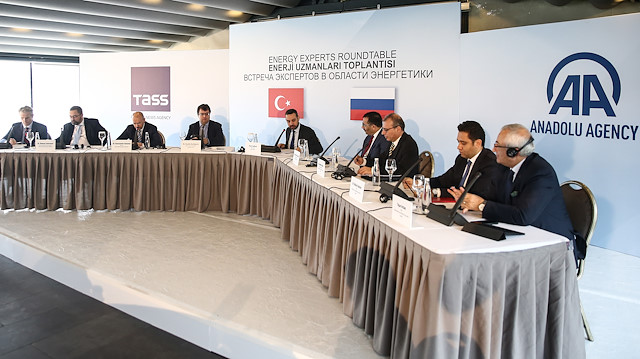
Dir. of Russia Nat. Energy Security Fund says gas trade should trump politics at Natural Gas in Future Energy Mix session
The director of Russia National Energy Security Fund urged panel participants at the Turkey-Russia energy experts round table meeting in Istanbul Thursday to follow Russia's lead in separating energy trade, particularly in natural gas, from politics.
Speaking at the session entitled Natural Gas in Future Energy Mix moderated by Editor in Chief of TASS, Maxim Filimonov, Konstantin Simonov said that all experts from Europe, and the U.S. and on the global market consider that increased consumption of natural gas in various regions is on the cards.
"Even the supporters of green gas and haters of hydrocarbon sources agree that natural gas is clean compared to oil and coal," he explained.
Simonov said that Europe is seeing a huge gas consumption increase and a rise in its gas imports. However, he acknowledged that in Europe, a lot of people are anxious about increasing the share of Russian gas.
"If we compare 2017 and 2007, in 10 years the import of gas in the EU increased by 94 billion cubic meters. This is a huge amount. Now, this year we will see maybe not huge but the continuation of this trend," Simonov said.
To cater to this trend, Russia's has increased its share in the European market, and according to Simonov, this share is set to increase despite Russia having been viewed as "dangerous for Europe."
"It's [share of Russian gas in Europe] expected to be around 36 percent this year, which is also our historical record," he underlined.
"We have supplied natural gas to Austria since 1968, for 50 years now and we still continue to supply," he affirmed.
He referenced the pressure that Russia came under to stop gas supplies to Turkey following the fall out from the November 2015 incident in which Turkey shot down a Russian warplane that had crossed into Turkish airspace from Syria. However, Gazprom carried on with supplies, a testament he said was to Russia's determination to separate gas trade from politics.
After the Nov. 24 jet crisis, Moscow took several measures against Turkey, including restriction of visa-free travel to a ban on imports of certain foodstuffs and a ban on the sale of Turkish holiday packages by tourist agencies to Russians. Russia had also called on its nationals to boycott Turkey as a tourist destination following the crisis.
He affirmed that Turkey, with its very diversified energy market with LNG from Azerbaijan and Iran, is an important market for Russia.
He acknowledged that Turkey has many supply options, but said that Russia can survive competition from other gas producers.
"This year we see some decline in Turkey but it's not a trend. It's about currency and less consumption. In the next years, Turkish consumption will increase and there will be economic growth in the country," Simonov said.





